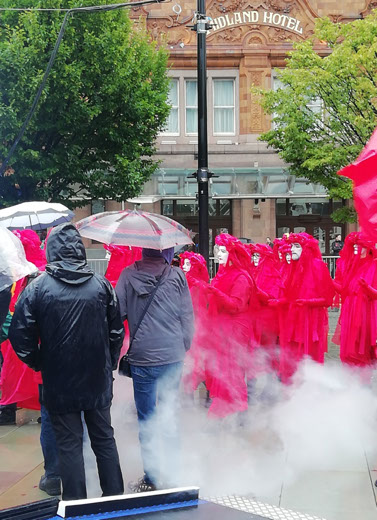
Manchester Celebrates
PETERLOO BICENTENARY: PROTEST, DEMOCRACY, FREEDOM
This year’s Newport Chartist Convention is exploring the links between the Peterloo Massacre of 1819 and the Newport Rising of 1839
Peter Strong reports on the events that took place in Manchester this summer marking the bicentenary of Peterloo

PETER STRONG gives his personal reflections on his DAY in MANCHESTER
Manchester is clearly proud of its radical history. There are many references to it around the city, including statues of John Bright and Frederick Engels, a memorial to the Manchester volunteers of the International Brigade in the Spanish Civil War and a whole museum, the People’s History Museum, dedicated to radical movements. A memorial to the victims of Peterloo has also been recently constructed.
A host of bicentenary events were organised around greater Manchester, stretching from May to September. The official brochure listed 12 exhibitions, 20 talks, 21 performances, seven workshops, eight walks and five film screenings directly or indirectly related to Peterloo. During my week-end in Manchester I was only able to visit a few of these.
The People’s History Museum, always well worth a visit, did not disappoint. It has a permanent Peterloo display to which was added a special temporary exhibition. The various images, documents and artefacts were complemented by a film featuring Mancunian actor Maxine Peake and a range of local people. An interesting inclusion, was a Chief inspector from Greater Manchester Police, commenting (obviously favourably) on the changing role of policing since 1819.
The recently refurbished Manchester Central Library, a magnificent building which has facilities Newport can only dream of, had an exhibition of its own. It also staged a play ‘Ellen’s Darkest Night’ about Ellen Wilkinson. Ellen was a Manchunian who gained fame as the MP who led the Jarrow Crusade in 1936 and later served as a Minister in the 1945 Labour Government. The play made several references to Peterloo (and incidentally to Ellen’s ‘posh friend’ Lady Rhondda). I was expecting a piece of standard ‘agitprop’ glorifying her career, but was pleased that it went well beyond this to explore the dilemmas faced by radical politicians once they find themselves in power and the messy compromises that often have to be made between ideological purity and practical action.
The main disappointment was ‘From the Crowd’, a piece of open air community theatre which was the centre point of the actual bicentenary day. The fact that it poured with rain all day did not help. (Rain in Manchester! Who would have thought it!) Although the music, the choir and the historical material shown on screen were very good, the performance itself suffered from elements which were so conceptual that the audience did not have a clue what was going on.
Attempts to get the audience to join in by reciting passages from the big screen were met with a half-hearted response, largely because the passages were too long. Above all, the tone of the event was wrong. Instead of recognising the achievements that went along with the growth of democracy since Peterloo such as the welfare state, the NHS, independent trade unions (while of course recognising that there is still much to be done) the tone was almost entirely negative. Much of the negativity was aimed at Manchester City Council (rather ironic since the council was a major funder of the event).
Much of the performance was given over to dealing with the problems of the homeless, the disabled and other groups in a way that left the impression that the council was a major cause of these problems and without any recognition of the huge problems councils face in the light of the savage spending cuts they have had to deal with over the last decade. One was left with the impression that present day councillors were the equivalents of the magistrates of 1819 in their attitudes to the people. This was reflected in various comments along the lines of ‘nothing has changed’ on social media.
In reality, of course, a great deal has changed. This event should have paid tribute to the martyrs of Peterloo and recognised the changes they set into motion that united the people of Manchester. It should have been a celebration of the achievements of the city and its determination to deal with the challenges it faces. Instead we had an event that was divisive and, in failing to recognise these achievements, ultimately disrespectful to the Peterloo martyrs and all those who followed them in the fight for democracy.
It was a black spot amidst an otherwise admirable series of events.









